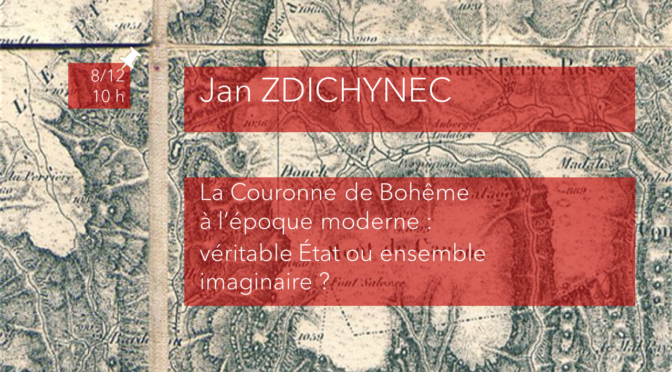
Third session of the 2023–2024 CEFRES Francophone Interdisciplinary Seminar The map and the border.
In 2023, we would like to start by questioning the very act of bordering and representing (a territory, a period, a trajectory), in short, thanks to the interdisciplinarity of our respective disciplines, to question the map and the border.
Location: CEFRES Library, Na Florenci 3, Prague 1
Dates: Friday, December 8th, 10 am
Language: French
Speaker: Jan ZDICHYNEC, Faculty of Arts, Charles University
Discussant: Václav ŽŮREK, Centre for Medieval Studies at the Institute of philosophy, Czech Academy of Sciences, Prague
Abstract
The presentation, based on the author’s own research and on several recent discoveries of unprocessed archival sources, will first present the Crown of Bohemia as a whole and ask whether it can be considered a functional state or not. These reflections will be placed in the context of writing about the lands of the Crown from the Middle Ages to the premodern period.
How did early modern intellectuals perceive the Crown of Bohemia and one of its parts, the margraviate of Upper Lusatia? It is clear that the historians who adopted the point of view of the Kingdom of Bohemia tended to write in more Bohemian-centric manner. Melchior Goldast and Pavel Stránský offer a more complex view despite its gaps and ambiguities. The historiography of one of the countries of the Crown, the Upper Lusatia, focuses more on the margraviate itself and its towns, and its perspective is rather local. None of the studied authors questioned the Bohemian crown as a whole, nor the subordination of its various countries to the Bohemian king, however the principles of these questions as a whole were not reflected in depth.
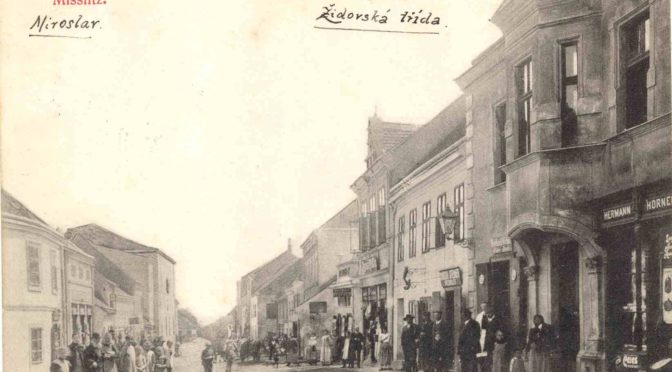
A lecture by Justyna Majewska (Jewish Historical Institute, Warsaw), in the frame of the seminar on Modern Jewish History organized by the Masaryk Institute and Archives of the Czech Academy of Sciences, Charles University CEFRES and the Prague Center for Jewish Studies.
Where: CEFRES Library, Na Florenci 3, 110 00 Prague 1
When: from 5:30 pm to 7 pm
Language: English
Abstract
Jews imprisoned in the Warsaw Ghetto pondered not only how to survive the present but also in the days to come. The day of liberation was calculated on the basis of rumours, interpretations of wartime developments and Kabbalistic prophecies. In this paper, among different notions of the future expressed by the inhabitants of the Warsaw Ghetto, I especially focus on the perspective of Jews active in various parties and youth movements. I approach the question of what Jews thought about the future, when it would start and what would lead to it within the broader context of the sociology of time. The primary source used in this paper is the Jewish underground press published in the Warsaw Ghetto.

First meeting of the cycle Produce and share knowledge in the digital era, with:
- Odile Grandet (general director for documentary equipment of the Campus Condorcet)
- Mélanie Leroy-Terquem (National library of France, Gallica)
- Candice Chenu (Quai Branly Museum, communication manager).
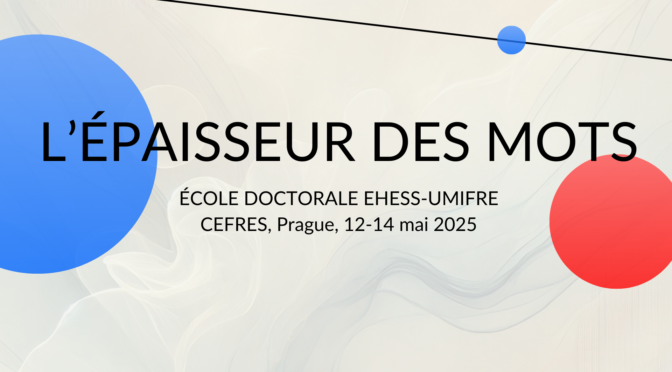
EHESS-UMIFRE Workshop
This doctoral programme will consist of four 2-3 hour workshops over two days, each focusing on a dialogue and joint readings.
Date: May 12-14, 2025
Location: CEFRES, Na Florenci 3, Prague 1
Language of the workshop: English, French
Organizers : EHESS, CEFRES (Prague), CRFJ (Jerusalem), IFA SHS (Frankfurt/Main)
Coordination : Falk Bretschneider (EHESS / IFRA-SHS) & Mateusz Chmurski (Sorbonne Université / CEFRES)
Argumentary:
How do we name the things that happen? If this question is always relevant, it is never as sensitive, divisive, or necessary as it becomes in times of crisis. The Russian invasion of Ukraine, followed by the crisis in the Near East that erupted on October 7, 2023—with their respective share of daily tragedies—give this question a cruel and painful urgency. How do we name what is happening to us? Pogrom. Resistance. Colonisation. Terrorism. Genocide. Segregation. Apartheid. War crimes. How do we choose these words, and who chooses them for us? Are these words precise enough to fairly capture reality, while broad enough not to be reduced to the empirical description of isolated events? If imprecision is a necessary attribute of language, how can we be sure that the intentions behind these words are free from manipulation, harmful visions, or dangerous ideologies? To which frameworks—legal, legislative, expert, academic—do these words belong? What do they permit, and what do they silence? How do they mobilise reason, emotion, moral judgement, or ethical and political positions? In what historical contexts were these words created or imbued with meaning, and how much would it cost to free them from those contexts? Indeed, to question, clarify, and correct the words we use as categories to analyse the world as it is—this is no easy task.
Program
Continue reading The Dimension of Words | Doctoral Workshop →
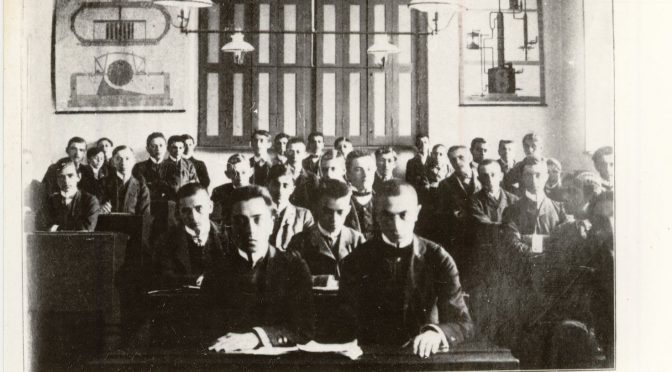
Young Researcher Workshop
Time & Venue: 2-6 pm at CEFRES, Národní 18, 7th floor, conference room
Organizer: Mátyás Erdélyi (CEFRES & CEU)
Language: English
Program
14:00 – Mátyás Erdélyi (CEFRES & CEU): The Commercial School in the Habsburg Monarchy: A Mittelschule or Alternative to the Mittelschule (1856-1918)
14:50 – Jitka Bílková (PedF UK): The Emergence of Vocational Education in the East Bohemian town of Jičín in the Second Half of 19th Century
15:40 – Coffee break
16:00 – Martin Pospíšil (FA ČVUT): Graphic Statics and its Transfer to the Czech Lands in the Last Third of the 19th Century
16:50 – Kamila Mádrová (ČVUT): Student Educational Excursions, Foundations and Supports as the Form of Practical Learning at the Business School of the Czech Technical University in Prague (1919-1939)
Discussants:
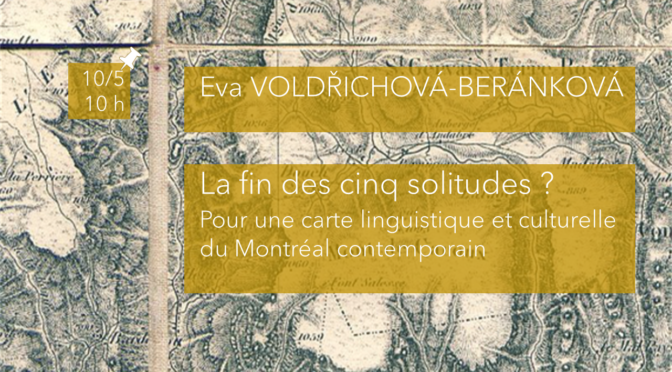
The End of the Five Solitudes? Towards a Linguistic and Cultural Map of Contemporary Montreal
Sixth session of the 2023-2024 CEFRES Francophone Interdisciplinary Seminar The map and the border
In 2023, we would like to start by beginning by questionning the very act of bordering and representing (a territory, a period, a trajectory), in short, thanks to the interdisciplinarity of our respective disciplines, to question the map and the border.
Location: CEFRES, Na Florenci 3, Prague 1
Date: Friday 10th, May 2024 from 10am to 12pm CET
Language: French
Speaker: Eva Voldřichová-Beránková (Faculty of Arts, Charles University)
Discussant: Mateusz Chmurski (CEFRES)
Abstract
In 1945, Hugh MacLennan’s renowned novel Two Solitudes explored the cultural alienation between Quebec’s French-speaking and English-speaking populations. Over three centuries, language, religion and socioeconomic factors have traditionally acte as barriers between these communities, fostering coexistence rather than integration. Since the 1980s, a revived academic interest in Montreal’s Yiddish culture had led to discussions of a “third solitude” characterizing certain Jewish diasporas in Canada. Simultaneously, a cultural and political renaissance among First Nations and Inuit peoples has been decribes as the “fourth solitude”, reflecting their unique life experiences. Today, authors of migrant literatures frequently evoke a “fifth solitude”, encompassing immigrants, their descendants, and native Quebecers who explore themes of exile and cultural adaptation. Montreal emerges as a historical nexus of these “five solitudes”, each shaping the city’s landcape and narrative. By examining specific neighborhouds, insights can be gained into how diverse linguistic and cultural communities have become ingrained in Montreal’s urban fabric, expanding across space and time. Through their literary contributions, they offer distinctive perspectives on the Canadian metropolis, contributing to its intricate linguistic, cultural and mental map. As Prime Minister Justin Trudeau commits to addressing the “trauma of historical solitudes”, consideration is given to the practical tools available to realize this aspiration.
View the complete seminar program for 2023-2024 here.






